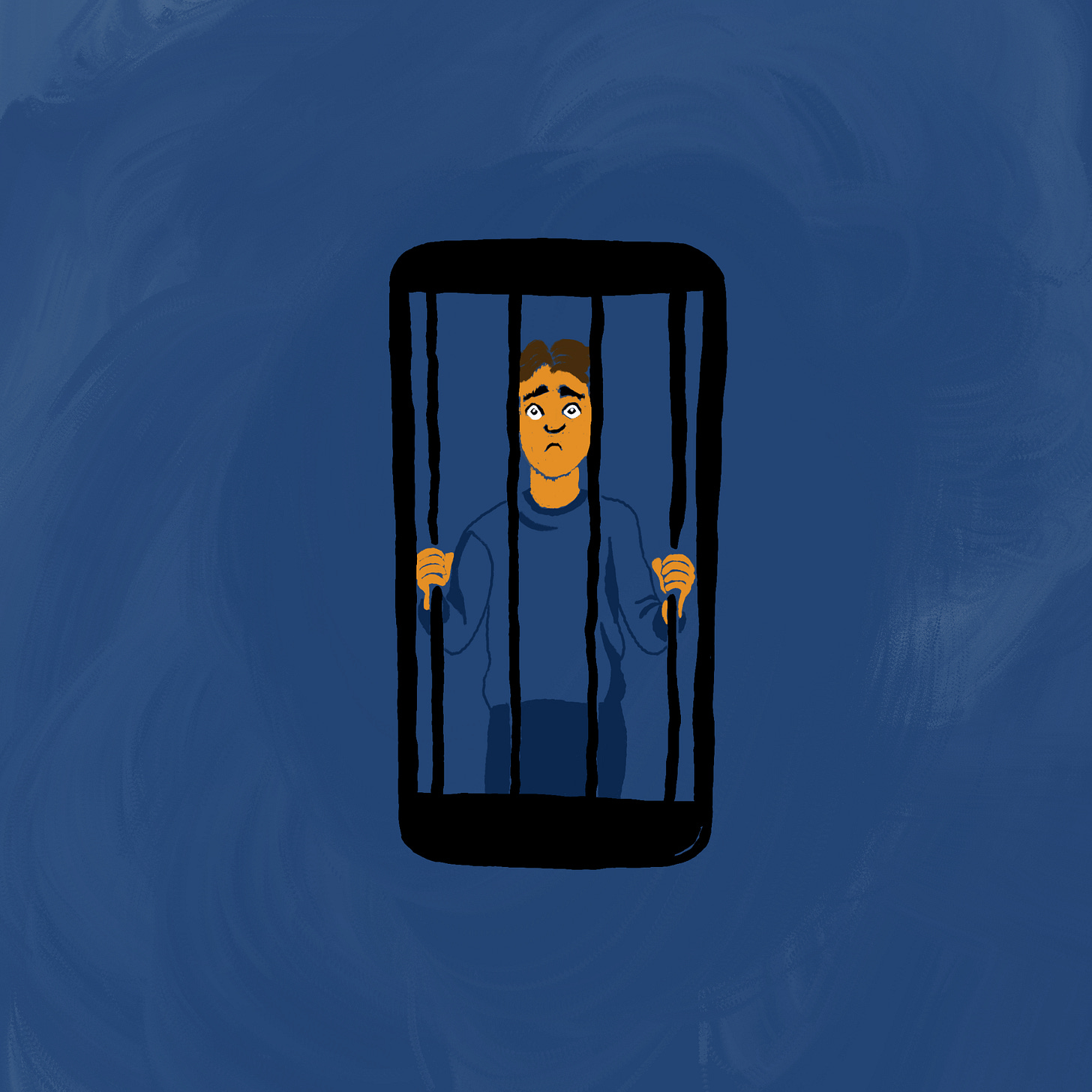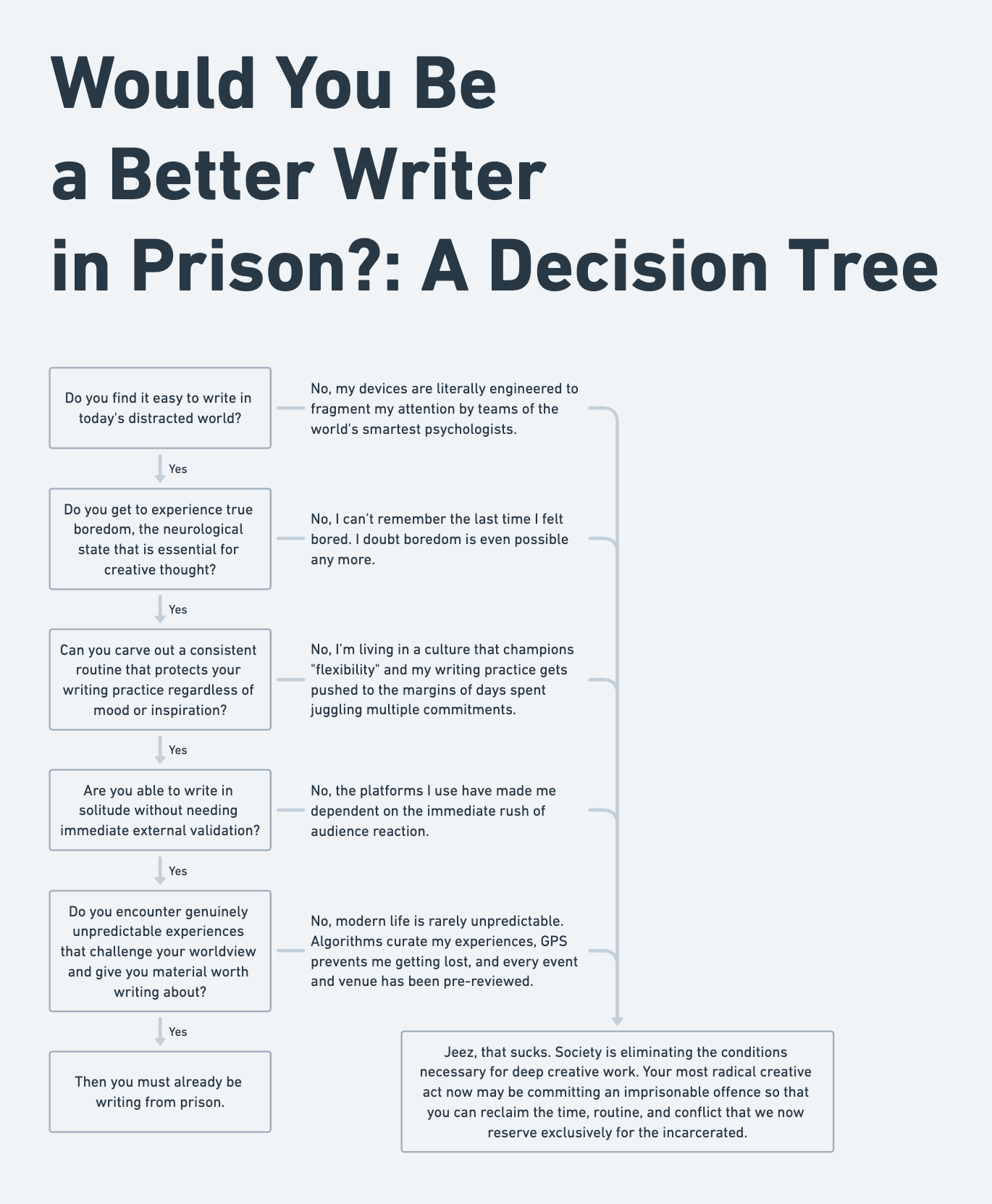Why you should commit an imprisonable offence some time in your life
🔥 Results from our 3rd Thematic Prompt Challenge
Hey, it’s Harrison 👋 Welcome to my publication about creativity as a tool for personal and professional growth.
If you're writing nonfiction that needs to connect with readers, I can help you sharpen your ideas and strengthen your voice. Learn more about my editorial support for writers.
And if you're a high-achiever ready to make a major life or career shift through a creative project, I offer 1:1 coaching to help you navigate that transformation. If you’re interested in how I can support you, you can learn more about me and then send me an email and we’ll set up a call to chat.
“I’ve often fantasized I would get a lot of writing done if I were put in prison for a minor crime. Three to six months.” – Amy Tan
BESTSELLING AUTHOR Robert Greene was asked who his biggest influences were, and he recalled how Friedrich Nietzsche would suddenly start writing things that he and his closest readers knew he did not actually believe.
It was as though Nietzsche used writing to become possessed by other souls, embodying their posture and assimilating their mind. This, Greene said, thrilled him as a fledgling author—the idea that writing could transform you into someone else.
I liked this idea and wanted to play with it, but spent the next few days wondering how.
Then, in a book about copywriting (recommended to me by friend and unofficial writing mentor Andy), I found the following prompt:
Write a case for why everyone should commit an imprisonable offence some time in their lives.
Seeing this gave me a delicious dose of Greenean excitement. Others responded similarly. And I knew that we should use it for our next thematic prompt challenge.
This post is where I share our responses.
I won’t say any more, except to thank all of you who took part: Darren, Andrew, Fis, Sarah, Andy, and Neha. And to say I think the quality of the submissions are amazing.
…aaand to remind all of you who’ve taken part in the first, second, or this third prompt challenge: you are ALL invited to our next Prompt Group Social, where we will:
discuss the impact of constraints in our practices
get some nourishing IRL time with fellow writers
and share next month’s prompt (my goal is to make them more delicious every time)
Check your email for the event invite 📬
Without further delay, here is our collective case for why everyone (yes, even you!) should commit an imprisonable offence some time in their lives.
Case #001
Who wants a trouble-free life? Turns out we all do. So, rules, police, judges, and punishment. The whole Ten Commandments.
But trouble‑free isn’t free for everyone. One person’s commandment is another’s oppression, and obedience is a particular jail. Laws evolve, communities differ, and systems corrupt.
Justice is altogether arbitrary.
I recognized this, each time I sped my pasty-white ass through my inner-city neighborhood in my sea‑foam green Prius, high as a kite. I wasn’t stopped once in ten super sketchy, wobbly years.
I should’ve been pulled over. My bloodstream would’ve screamed felony. I should’ve been locked up. But I wasn’t, repeatedly, while poorer, darker-skinned neighbors were. Some still are, their lives ruined.
Everyone should commit an imprisonable offense; I suspect many of us have or will, which doesn’t always equal wrong. Whether you get away with it or not, the prospect of prison is an opportunity to wrestle with guilt, ponder liberty and, perhaps, turn problematic behavior around.
It’s also a chance to ask: Is justice as blind as we think?
Postscript: I stewed in jail once, because of a fight. A younger guy and I were equally at fault. Karma yadda, yadda. The police only arrested me.
By Andrew Printer
Case #002
Manifesto for the Brave and the Damned
Who defines right and wrong anyway?
The system? The suits? The same people who rewrite the rules to serve themselves?
Everyone breaks the rules.
Learn the rules of the game, then break them. Rage against the cage of conformity.
Relish the exhilaration of the illicit, the forbidden.
Dance with danger.
This is the domain of mavericks, pioneers, change-makers. The remembered.
You are sovereign.
Not a slave to the system.
Not another brick in the wall. Not boxed in, one foot nailed down.
You were not born to play nice. Play fair.
Cower and comply like a good little boy or girl.
Don’t you dare live in fear;
not of punishment, not of power, not of stepping out of line.
The system wants you afraid.
It is sick.
Built on selective morality, elastic ethics.
Justice bent for the rich.
Power hoarded by the corrupt.
How will you ever know what you’re capable of
if you never cross the line drawn to keep you small?
How will you know the edge of your courage
if you never risk consequence?
Break out!
Break something!
Even if it’s just the illusion that obedience makes you good.
That’s where freedom lives.
That’s where you begin.
By Darren Farfan
Case #003
In 1941, Alan Turing broke the Enigma code.
In 1952, his government found out he was gay, convicted him of gross indecency, and forced him to choose between imprisonment and chemical castration. For reasons we take for granted in 2025, we don’t treat people like this anymore.
In 1967, private acts of homosexuality between adult men were decriminalized in England. It was too late for Turing, but this change in legislature was a landmark moment for everyone who came after him. The law had changed, and attitudes were too, if slowly.
Sometimes laws change culture. Sometimes culture changes laws. The two operate in tandem, like the wind and the tide both pushing a boat over water – sometimes they work in great harmony and people go far, and sometimes they seem to conspire to tear everything apart, making victims of heroes.
I won’t advocate for any specific crime here, or for crime itself. I’m saying that as a matter of course, the things we take for granted – like laws and culture and other foundations of societal infrastructure – need to be tested. Whether through healthy debate, controlled experiments, or literal crime (intended or not), we need to build our ships with intention.
By Neha Patel
Case #004
The following lies are true.
I am a criminal. Always have been. LIfe began by prison breaking from mother. The first year was viscera. Little has changed.
I am behind the wheel of a stolen cookie monster blue station wagon. Two types of blood sticky and drying to my parts, my own and someone’s who will maybe make it.
Two days ago I was a dirty rotten nobody. Now I am a bloody stupid somebody. There is little chance I make it past the end of this story. I can see my pulse painting down my leg. I’m not good. I am honest. Sorry my breathing sucks.
“I think you should do this.”
That was all it took to convince me. Maybe that will convince you too.
“I think you should do this.”
It’s a bear, this moose. A half circle smirk silently humming Fiona Apple on the radio. You are the lawmaker or the law makes you. I never made much of anything. I stole it all.
Choice is illusion. My magic was believing that I had one. I don’t hurt anymore. I feel.
Today started empty. It ends with purpose, even if that purpose is just the end.
By CansaFis Foote
Case #005
The Comfort Zone Prison
We're already imprisoned. By comfort, compliance, conditioning, and the fear of consequence.
Every single day, waking up in a cell of our own making. Jobs that drain our soul because they're “secure". Silent when witnessing injustice because speaking up is risky.
Choosing ease over ethics... convenience over conviction... the path of least resistance that leads nowhere you actually want to be.
This isn't living, beautiful souls. It’s sleepwalking through a life too small for your spirit.
Real freedom? It requires risk. Ask any grandmother arrested for women’s rights. Ask anyone who chose principle over their precious personal safety and discovered something fierce and beautiful about themselves.
That night in custody... whether for climate action, social justice, or defending your community... isn't punishment. It's liberation from the prison of "what will people think?"
In those hours, you discover that consequences for doing right feel completely different than consequences for doing wrong. One breeds shame that eats you alive. The other? Clarity about who you are.
Bars may contain your body but your soul soars.
So yes, get arrested. Not recklessly... but righteously. For something that matters more than your fucking comfort zone.
By Sarah Ennett
Case #006
The first time I was imprisoned, it was for attempting to knit a traffic warden into a pullover. He looked cold. And frankly, smug.
We all need one good scandal. Not something dreadful — not arson, or murder, or using Comic Sans in a formal letter — but something faintly ridiculous. Something that says: “I was here. I got bored. I poked the rules with a spoon.”
Imagine a world where everyone is obedient. No sock thefts. No rogue allotment takeovers. No spontaneous kazoo parades in restricted zones. Just grey people in grey shoes eating beige food and saying “yes” a lot.
No thanks.
Give me the woman who tried to marry a lamppost.
The man who refused to stop dancing in the cheese aisle.
The pensioner who spray-painted rude haikus on a banker’s Audi.
Laws are fine. Most of them. But once in a while, the spirit needs a wobble. To be slightly arrested for slightly living.
Besides, prison has biscuits. Or so I hear.
By Andy Hawthorne
Case #007
By me 👨🎨
(This decision tree format is entirely stolen from Carlos Greaves and his brilliant piece in defence of gymnast Simone Biles)
That’s all folks!
Stay tuned for next month’s prompt challenge.
Harrison 👨🎨













…every one of these just burns…seems like this was an interesting and kind of difficult prompt for many…to which I say (puts on Judas Priest “Breaking The Law”)…
"But once in a while, the spirit needs a wobble." HELL YES!